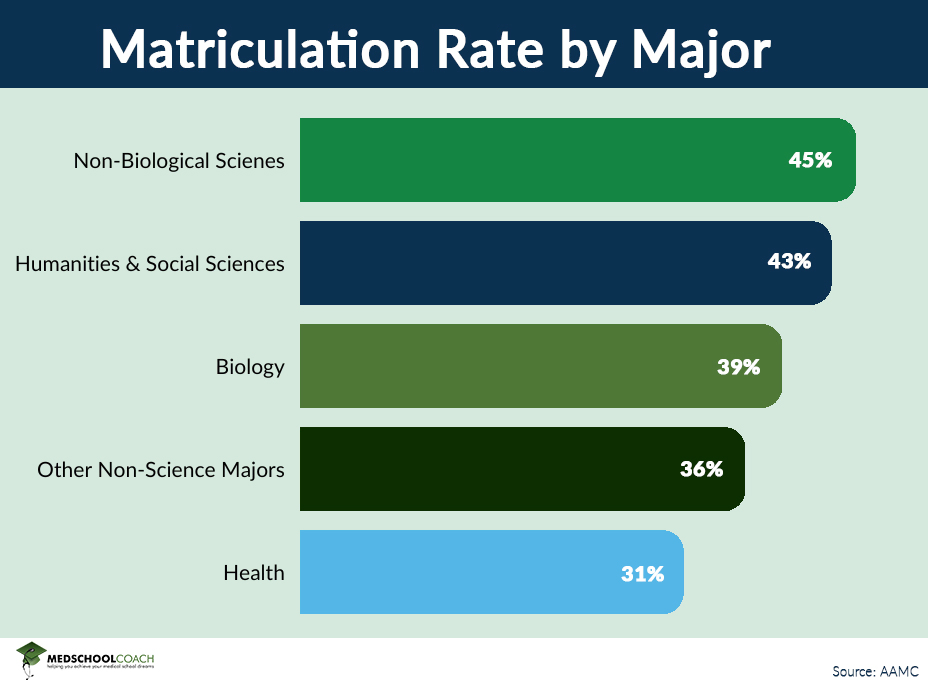
Table of Contents
Knowing you’d like a future career in medicine while you’re beginning to apply for colleges is already one step ahead of most high school graduates. Choosing the right undergraduate major in college can feel like a big decision. It is the first foot forward on the path to becoming a doctor.
What is the best pre-med major? Biochemistry and microbiology are the most popular pre-med majors. These biological sciences focus on the way living organisms work, offering a great foundation for a medical school application.
But there’s no one-size-fits-all answer to what the best pre-med major will be for each person. After all, you can get into medical school with any bachelor’s degree (as long as you meet the requirements for prerequisite courses).
Choosing the right major for you should involve your own interests, strengths, and plans for your future career plans in healthcare. Whatever pre-med school you choose, we’ll help you understand what you need to do in undergrad to create a strong foundation.
The Most Popular Pre-Med Majors
Several majors have traditionally been popular among pre-med students because their required coursework aligns with medical school prerequisites. They include:
- Biology (including molecular biology, immunology, and microbiology)
- Biochemistry (including biotechnology and genetics)
- Chemistry
- Neuroscience
- Psychology
The rigors of medical school can be demanding, and for good reason — doctors have a significant responsibility to their patients. That’s why majors that provide a foundation in core science courses and skills you’ll need as a physician are more attractive for pre-medicine studies.
Understanding biology helps in diagnosing and treating diseases, while organic chemistry helps you understand the chemical properties of drugs and how they interact with the body.
Even sciences like physics teach you about the physical principles that underlie many medical technologies, such as imaging techniques.
Biology
Biology is the closest to a traditional pre-med major, as it covers a broad spectrum of topics that provide a strong foundation for understanding human health and disease. Biology majors can specialize in areas such as molecular biology, immunology, or microbiology.
As a biology student, you will gain valuable laboratory experience that can help you in medical school. In addition to traditional biology courses, these pre-med students may also take courses in anatomy and physiology, which can be helpful for future medical study.
Outside of the classroom, biology majors may have opportunities to participate in research projects or internships at hospitals or public health clinics. These extracurriculars can help students gain valuable hands-on experience and make connections in the medical field.
We can help you ace your college application to get into the pre-med program of your choice.
Biochemistry
As its name suggests, biochemistry deals with the chemistry of living organisms. It’s a natural fit for pre-health, and the coursework often overlaps with popular MCAT topics.
Biochemistry majors study the chemical processes that occur inside cells and may work on research projects in areas such as genetics and biotechnology. Outside of the traditional biochemistry courses, students majoring in biochemistry may also take courses in microbiology, genetics, and immunology.
Students majoring in biochemistry may have opportunities to participate in research projects or internships at biotech companies or research labs. The valuable hands-on experience and potential for mentors can provide great resources for letters of recommendation and ideas for your personal statement.
Chemistry
Chemistry majors have a strong focus on the sciences, with a particular emphasis on chemical reactions and properties.
Courses include physical chemistry, analytical chemistry, and biochemistry. These help students who want to study medicine develop analytical and problem-solving skills useful for the medical school application process and future healthcare careers.
Chemistry majors are also attractive candidates for research projects or internships at pharmaceutical companies or research labs.
Neuroscience
Neuroscience is a multidisciplinary science that incorporates biology, chemistry, psychology, and physics. The broad foundation of this major can be a huge boost for future doctors.
The focus on the biology of the brain makes these undergraduate studies a good fit for aspiring cognitive neurology and neuropsychology physicians.
Neuroscience often provides opportunities to get involved in research, a valuable experience for pre-med students. It not only strengthens your medical school application but also helps you develop a deeper understanding of scientific methods and principles.
Psychology
Students explore the human mind and behavior as psychology majors. They can study topics such as personality, social psychology, and abnormal psychology. This interdisciplinary field intersects with biology, sociology, philosophy, and more.
The base of knowledge from studying psychology can be very valuable in medicine, particularly in specialties like psychiatry or neurology. Understanding human behavior is essential for doctors, and psychology majors can gain valuable insights for patient care.
Note: Most universities offer both a Bachelor of Science and a Bachelor of Arts in psychology.
A BS in Psychology typically provides a more science-based curriculum, focusing on the technical and practical aspects of psychology. It delves deeper into the scientific method and statistics, requiring more labs and scientific research courses.
On the other hand, a BA in Psychology often provides a broader liberal arts education requiring more general education courses and coursework in the social sciences or humanities.
Both of these degrees can work for prospective medical students. You’ll just need to keep an eye on prerequisites and tailor your class schedule accordingly.
Pros of Majoring in a Science Field
Majoring in a science field can be advantageous for students who are interested in pursuing a career in medicine. It provides critical foundational knowledge and offers benefits that can help pre-meds succeed in medical school and beyond.
Overlapping Coursework
One of the major advantages of majoring in a science field is that the required coursework can make it easier for pre-meds to meet the necessary course requirements for medical school.
For example, many science majors require courses in biology, chemistry, and physics. All of these subjects are heavily tested on the MCAT (Medical College Admission Test), and many are required courses for incoming medical students.
By completing these courses as part of their undergraduate degree, science majors have a head start when it comes to studying for the MCAT and the future course load in medical school.
Many medical schools require a minimum number of science courses. This means many science majors may already have met these requirements before they even begin their medical school application process.
This allows pre-meds to focus on other aspects of their application, such as research and extracurricular activities, rather than carrying an extra-full course load of elective science classes.
Research Opportunities
Another pro of majoring in a science field is the availability of research opportunities. Research experience can be incredibly valuable when it comes to building a strong application for medical school.
Research shows medical school admissions committees that you’re serious about pursuing a career in medicine and have the necessary skills and curiosity to succeed. This experience helps you develop important skills like analyzing data, working collaboratively with others, and communicating scientific findings to a broader audience.
Early Start to Your Medical School Foundation
Perhaps the most important advantage of majoring in a science field is the strong foundation it provides for medical school. The foundational knowledge gained in science courses is incredibly valuable when it comes to medical school coursework.
As an added bonus, majoring in a science field fosters critical thinking and problem-solving skills via the scientific method. These skills are crucial for diagnosing and treating patients.
Non-Traditional Pre-Med Majors
While science majors are common among pre-med students, they are not the only path to medical school. Some of the best non-traditional pre-med majors include:
- Physics
- Mathematics
- Physical therapy
- Nursing
- English
- Social sciences (sociology, economics, anthropology, or political science)
- Humanities (ethnic studies, international relations, or a foreign language)
Majors in humanities, social sciences, physical sciences, or even English can provide unique perspectives and skills.
A major in English can enhance communication skills, and humanities majors, on the other hand, can help develop cultural competency. Meanwhile, social science majors have an understanding of the social determinants of health. Mathematics can lay a solid foundation for future doctors interested in statistics-heavy research, like an MD-PhD path.
Benefits of non-science majors include:
- Developing a unique perspective
- Pursuing personal interests
- Providing something unique to admissions committees
Students that choose a non-science major will still need to complete the prerequisite science courses for medical school. This is something to consider when planning your school schedule and extracurriculars.
Frequently Asked Questions
Is pre-med a major?
There’s no definitive “pre-med” major. Med school applicants can be working toward a bachelor’s degree in anything from health sciences to Spanish. But certain majors are more of a pre-med track, covering more of the topics and subject matter that a future doctor will be required to know.
What major is closest to pre-med?
A major that is closest aligned to pre-med studies is biological science. Biological science majors will more than likely take the medical school prerequisites as part of their standard coursework.
What are the prerequisites for pre-med majors?
According to the Association of American Medical Colleges (AAMC), prerequisite courses for pre-med majors include biology, chemistry (including organic chemistry), physics, and English.
Depending on the medical school, additional course requirements may include biochemistry, social sciences, and humanities electives. If there are medical schools that you already have your eye on, check the Medical School Admissions Requirements (MSAR) database to be sure you’ve completed the correct coursework.
GPA and MCAT Considerations
When deciding on your pre-med major, you need to consider your overall GPA and MCAT scores because they are the most critical factors when it comes to medical school admissions.
Selecting a major that you’re passionate about can sometimes mean you’re more willing to spend extra attention on maintaining a high GPA while completing the necessary requirements.
Your GPA and MCAT scores are not the only things that matter, though. Admissions committees also look for evidence of leadership, community service, research experience, and other extracurricular activities. They’re interested in how you have spent your time demonstrating your commitment to medicine and your ability to excel in a demanding field.
Choosing the Best Major for Your Pre-Med Studies
The best major for you as a pre-med depends largely on your interests, abilities, and career goals. If you are still in high school and are already quite certain that you want to become a doctor, choosing a science major will get you started on your path earlier.
If after your first year, you’ve changed your mind, it is much easier to switch from a science major to something else than it is to switch to a science major and catch up on necessary classes.
Regardless of your major, maintaining a high GPA, especially in prerequisite courses, and scoring well on the MCAT is essential. It’s also valuable to gain relevant experiences such as internships, research, or volunteering in health professions, which can be a crucial part of your medical school application.
Select a major that you’re genuinely interested in and in which you’re likely to excel academically. This strategy not only allows you to enjoy your undergraduate years but also ensures you have a compelling backup plan, should your aspirations change.
Speak with a member of our enrollment team who can help you ace your college applications for your chosen pre-med program.

Kachiu Lee, MD
Dr. Lee specializes in BS/MD admissions. She was accepted into seven combined bachelor-medical degree programs. She graduated Summa Cum Laude from Northwestern University and proceeded to Northwestern University’s Feinberg School of Medicine in Chicago, IL. After completing a dermatology residency at Brown University, Dr. Lee pursued a fellowship in Photomedicine, Lasers, and Cosmetics at Massachusetts General Hospital and was a Clinical Fellow at Harvard Medical School. Academically, she has over 100 peer-reviewed publications and lectures internationally.








